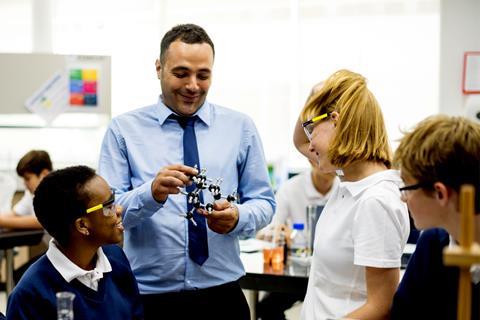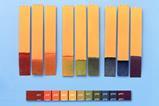Kristy Turner flies the flag for outreach and encourages academics to try their hand at ‘experiential learning’ in the classroom

Widening participation targets are increasing while outreach budgets are stagnating; in the current economic climate aren’t we all searching for the holy grail of outreach? Outreach that involves the whole staff team, provides value for money, engages potential students with the department, supports them to achieve grades that enable them to access our courses, supports teaching and learning in schools and has an impact on teaching and learning in the department. That’s quite a wish list without even considering how many of those boxes in the school development plan we can tick.
Bridging the gap
During my year as the Royal Society of Chemistry school teacher fellow at the University of Manchester, I came up with the idea that if we could get academics to go into schools or colleges to teach just one A-level lesson then we would go some way to bridging the gap between school and university chemistry. After all, I can talk until I am blue in the face about the student experience at A-level, how their skills have changed over the last decade or so, but there is nothing like actually experiencing it. It’s this kind of ‘experiential learning’ that Ofsted love! My first (and for a long time, only!) volunteer was Stephen Yeates, professor of polymer chemistry and head of our physical chemistry section. Soon we had a date, a partner college in Winstanley College and a topic, introduction to kinetics.
I envisaged planning the lesson as one of the main areas where Steve would see a difference between the approach in universities and schools. Universities are to a certain extent able to set their own curriculum and outside of the basics in the first and second years of a degree course, academics can often teach their own ‘pet’ subject and set the exams to match. So we sat down with the syllabus and I tried to give Steve a flavour of how many of the syllabus objectives it would be feasible to cover in the lesson and how a school teacher would approach them. In universities the traditional lecture is still very much alive but in schools, standing and talking at students for an hour or more is positively discouraged by the expectations of both students and Ofsted. In their planning teachers aim to include a variety of student learning activities in order to meet the learning objectives.
What, no lesson plan?
And so the day arrived, we have the chemicals that the college doesn’t have, we have the worksheets, Steve has no PowerPoint just his revision guide and we get lost. The college is very welcoming and understanding and thankfully we arrive in time for the lesson. Steve was nervous as the group of 17 year olds files into the room and take their places but he does at least freely admit his nerves to them and we make a start. It becomes clear that lesson plans are definitely an alien concept where academics are concerned. The starter and introduction part of the lesson takes 40 minutes and only a few students are brave enough to respond to Steve’s questions despite them being pitched at exactly the right level. Steve visibly relaxes as the lesson proceeds, not everything goes to plan with the practical but we adapt and we most definitely do not have time for the second part of the plenary. The art of ‘winging it’ is an essential skill for an A-level teacher and I have to say it does seem to come naturally to Steve. The data collected is imperfect but good enough to start identifying trends and suggesting rate equations. At the end of the lesson we haven’t done everything we had planned but the students have definitely learnt something. Steve seems to have enjoyed himself and learnt a lot along the way and we leave eagerly discussing how we can disseminate this to the rest of our colleagues back at Manchester. Our small scale project continues with two or so academics going out each year.
I think I learnt a great deal and hopefully the students a little! So stand up and go forth.
The enlightened academic
Reflections from Steve – ‘I must admit that this was one of the more daunting experiences of recent times but I thought it a great opportunity to start to understand where our students are coming from. The students were bright and attentive and obviously enthusiastic about their studies and looking forward to university. What struck me was how different the modes of teaching at A-level are compared to those golden days in the 70s. On reflection when lecturing I think of when I was that student and not how the students are today. I have already started to apply some of these thoughts to how I deliver material … I would positively encourage everyone to take up this opportunity especially those delivering year 1 material. Although nervous to start it was fun, I think I learnt a great deal and hopefully the students a little! So stand up and go forth.’














No comments yet